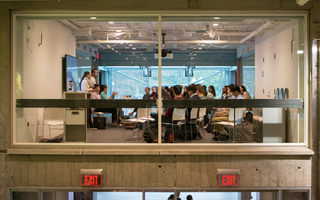{shortcode-9a6b8adc3baa5ea7e8447eb5cd0d7a2eec6d8def}
Though recent changes to the way the College funds student groups left the Undergraduate Council with more money than ever before, the overhauled funding structure has also sparked newfound disagreements within the body about when it should step in to fund student events.
For three consecutive weeks now, the UC’s Finance Committee has not imposed any across-the-board cuts to its grants to student groups. The lack of cuts comes just one semester after the Council had to consistently diminish its grants by over 25 percent each week.
The rosy financial picture is likely a result of the Council budget, which is 34 percent higher this year than last. That increase has also allowed the Council to allocate more funding to every one of its committees.
Yet at multiple meetings this fall, the Council voted against allocating money for events that it claims are not their responsibility to fund.
At Sunday’s meeting, despite opposition by numerous representatives, the Council allocated $10,000 to buttress funding for a campus-wide party in Annenberg — the freshman dining hall — on Nov. 16, the evening before the Harvard-Yale football game.
While opposition to two other prospective programs in recent weeks — funding student dinners and advising meetings — appeared to be case-specific, the debate about whether to lend a hand to those other groups will likely remain an ongoing dispute, according to multiple representatives.
The changes to the Council’s budget came as a result of a 150 percent increase in the student activities fee — an optional sum undergraduates pay as part of enrollment costs — and accompanying changes to the way the UC, College Events Board, House Committees, and the Intramural Sports Council receive funding. While House Committees previously fell under the auspices of the Council, they now apply for money independently to a funding board composed of students and administrators.
UC Finance Committee chair Gevin B. Reynolds ’19 said these changes mean the Council no longer has an obligation to fund events for which any of the above groups should be responsible.
“It was my understanding, that this year, with the new funding structure, CEB was supposed to have the financial ability to plan, run, and fund their own events, and the UC would have the money to fund our own initiatives,” he said. “The [CEB] supposedly should get the money from the administration to fund their events on their own.”
Other representatives said the Council’s overarching mission — to serve the student body — should compel them to act in certain instances, especially if other groups, such as the CEB, feel financially constrained. Lowell House Representative Julia M. Huesa ’20 argued that, because the UC and the other three groups ultimately draw from the same “pot of money,” they should not see themselves as clashing bodies.
“One of the goals of the UC is to fund inclusive social life,” she said. “Ultimately, if they’re funding something that’s going to be for the entire student body, it’s in the interest of the UC to fund that.”
At its Oct. 8 meeting, the Council narrowly voted down legislation to help the Lowell House Committee fund its annual party, “Glowell.” At the time, representatives raised similar concerns about funding house parties, which many called the domain of House Committees. Some said it could be the start of a slippery slope that leads the UC to fund more and more events.
Vice President Nicholas D. Boucher ’19 said Sunday that he continues to harbor reservations about helping the CEB and House Committees fund their own events, but ultimately voted for the legislation at Sunday’s meeting because CEB leaders agreed to name the UC as co-hosts. The legislation ultimately passed, with 24 in favor, 8 against, and 2 abstaining.
“If it had been purely a CEB event where the UC was giving a grant to help them do an event of their own, I would have been against it for the reasons Gevin mentioned,” Boucher said.
He added that the new funding scheme should give each of the four groups financial independence. In reality, though, “growing pains” associated with the new system — as well as some groups exceeding their financial means — has prevented that from happening, he said.
“If each group is advocating for the amount they believe they need for the entire year, theoretically, there shouldn’t need to be any requesting of funding from the UC from either CEB, IMs or the HoCos,” Boucher said. “What we’ve seen is that that’s not the case.”
— Staff writer Jonah S. Berger can be reached at jonah.berger@thecrimson.com. Follow him on Twitter @jonahberger98.
Read more in College News
‘Wolf of Racial Bias’ Returns to Courtroom on Final Day of Harvard Admissions TrialRecommended Articles
-
 Palaniappan and Huesa Plan to ‘Make Harvard Home’
Palaniappan and Huesa Plan to ‘Make Harvard Home’ -
 Khoury and Agrawal Push Transparency and Accessibility
Khoury and Agrawal Push Transparency and Accessibility -
 UC Allocates Wintersession Funds, Retain Full Control Over Eligibility
UC Allocates Wintersession Funds, Retain Full Control Over Eligibility -
 Undergraduate Council Leaders Outline Changes to Council Committees, Inclusion Efforts
Undergraduate Council Leaders Outline Changes to Council Committees, Inclusion Efforts -
 UC Votes to Appoint Director of Belonging and Inclusion
UC Votes to Appoint Director of Belonging and Inclusion













